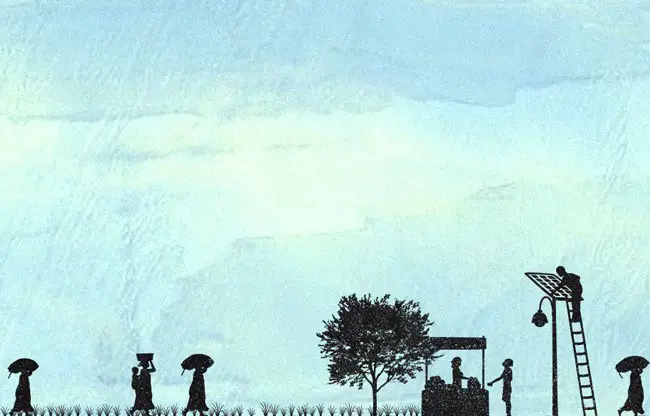
Note: To reserve your $12 ticket for “Poverty Inc.” and ensure its showing at Palm Coast’s Epic Theater on Feb. 23 at 7:30 p.m., go here. The deadline is Feb. 16. Organizers must sell 87 tickets to ensure the showing. As of today, 63 tickets have been sold.
![]()
People who fight poverty do so with good intentions. But they can create more problems than they solve. They usually do, often ending up benefiting more than those at the receiving end of the charity, whether in feel-good or actual currency.
The problem is illustrated by many stories in “Poverty Inc.,” the 2014 documentary by Michael Metheson Miller, a fellow at the conservative Acton Institute in Grand Rapids, Mich. One story in particular tells the tale, that of a farmer in Rwanda. He had a small business producing and marketing eggs. Then a church in the United States decided to fight hunger in his neighborhood. The congregation sent eggs. It was a nice gesture. It was also disastrous. The free eggs put the Rwandan farmer out of business and demolished what local egg-farming economy existed. And when the donated eggs dried up, the community at the receiving end of the generosity was worse off than before. The same thing happened on a much larger scale during the Clinton administration, when tons of rice were dumped on Haiti as food relief without thought to what the rice did to the local economy. It prevented it from recovering.
Clinton publicly apologized in 2010. “It may have been good for some of my farmers in Arkansas, but it has not worked,” he told Amy Goodman on Democracy Now in a variation of comments he delivered to a congressional panel. “It was a mistake. It was a mistake that I was a party to. I am not pointing the finger at anybody. I did that. I have to live every day with the consequences of the lost capacity to produce a rice crop in Haiti to feed those people, because of what I did. Nobody else.”
“Poverty Inc.” focuses on that paradox: the crippling effects on self-sufficiency of aid programs, from those led by governments to those championed by celebrities. The documentary’s thesis is the same as Clinton’s. The approach has not worked.
Dropping bags of aid on the poor hasn’t worked. A different approach might.
It’s a depressing story. There’s not much “feel-good” stuff about “Poverty Inc.,” which never went into wide release. But it gives viewers plenty to think about, and a few ideas about how to be more effective poverty fighters. One such idea is to find programs that foster entrepreneurship rather than dependence.
The film has garnered its share of prizes and critical acclaim, and since its original release has been touring the country in locally organized screenings and on numerous college and university campuses, including at Harvard Law School.
One such screening is planned for Palm Coast at Epic Theater in Town Center on Feb. 23 at 7:30 p.m.—provided the organizers get a pledge of 87 tickets sold by Feb. 16. They’re more than two-thirds of the way there: as of today (Feb. 4), 61 tickets have been sold (at $12 apiece). For “Poverty Inc.,” the Palm Coast showing would be a rare Florida showing (in the state, it’s only been screened once in Hollywood.)
Bringing the film to Palm Coast is the idea of Jenny Skripko and her husband John, who works with Edward Jones and is a past president of Flagler County Rotary.

“We’re a very kind of mission-minded family, we do a lot in the community as a family, so we’re automatically drawn to this kind of thing,” Jenny Skripko said, explaining her connection to Trades of Hope, which she’s fostered with her teen-age daughter.
But she, too, had to change perspective on poverty. “By nature I like to automatically give, and I’ve never thought much further than that,” Skripko said. “It was just, Let me help you meet this need. That’s where it stopped for me.”
Then she saw “Poverty Inc.”
“After viewing the film I got to thinking past the donate button,” she said. “It’s not always charity people want. Sometimes they want opportunity.”
Tuesday evening Jenny and John Skripko appeared before the Palm Coast City Council in their efforts to spread the word about the movie. If enough tickets are sold, John said, “they’re going to actually have one of the producers fly down to Epic Theaters on Feb. 26 at the showing and do a 30-minute questions and answer period afterwards.”
Jenny saw the film in its entirety. “It won’t disappoint,” she said. “It will not only challenge you on how you look at poverty, but also how you perceive those individuals who are in poverty. They truly challenged me as well.” She said the film will generate discussions on how poverty affects individually, not just globally, “but as a community as well.”
![]()
Note: To reserve your $12 ticket for “Poverty Inc. and ensure its showing at Palm Coast’s Epic Theater on Feb. 23 at 7:30 p.m., go here. The deadline is Feb. 16. Organizers must sell 87 tickets to ensure the showing. As of today, 63 tickets have been sold. Visit the “Poverty Inc.” website, or see the trailer below.





























scoff the cuff says
Yes, instead of (feel)good intentions, we should be exporting the story of our gaining Independence, and the capitalism that followed. We did once, and nations became democratic, and free, by our lead and example. What happened to the gift greater than charity? The “city on a hill” that strengthened hearts, gave hope, and created purpose in the people of the world.
Why cling to this new (?) balkanization in beliefs and politics, et cetra. A nation and people united stands, and can then lift up.